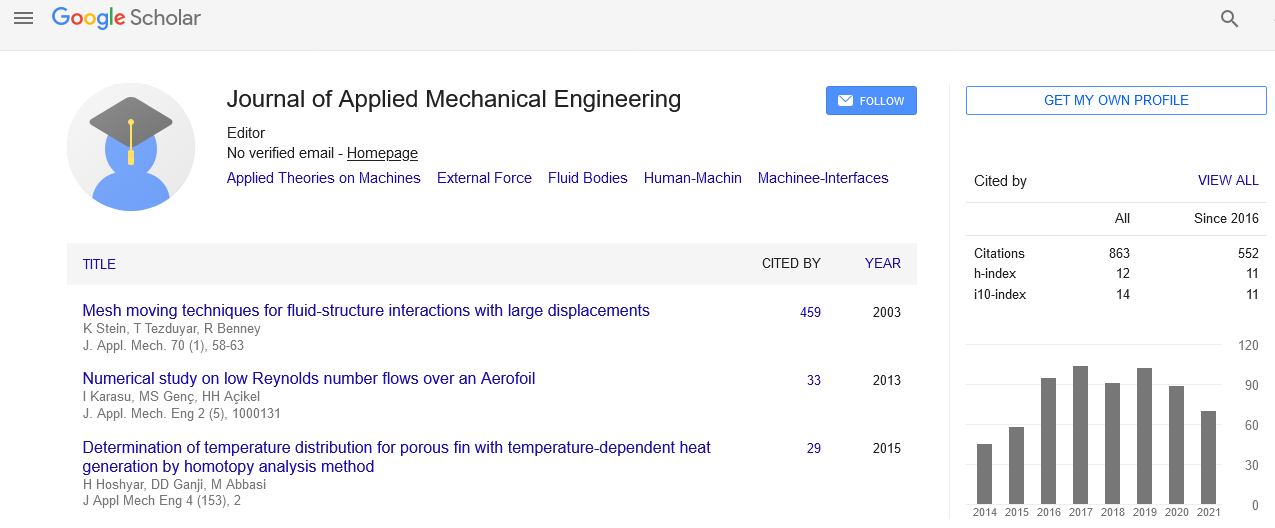Indexed In
- Genamics JournalSeek
- JournalTOCs
- CiteFactor
- RefSeek
- Hamdard University
- EBSCO A-Z
- OCLC- WorldCat
- Publons
- Google Scholar
Useful Links
Share This Page
Journal Flyer

Open Access Journals
- Agri and Aquaculture
- Biochemistry
- Bioinformatics & Systems Biology
- Business & Management
- Chemistry
- Clinical Sciences
- Engineering
- Food & Nutrition
- General Science
- Genetics & Molecular Biology
- Immunology & Microbiology
- Medical Sciences
- Neuroscience & Psychology
- Nursing & Health Care
- Pharmaceutical Sciences
Innovative EDL GNC technologies for next-generation Mars exploration missions
International Conference and Exhibition on Mechanical & Aerospace Engineering
September 30-October 02, 2013 Hilton San Antonio Airport, TX, USA
Shuang Li
Accepted Abstracts: J Appl Mech Eng
Abstract:
All Mars Landers to date continue to rely on the entry, descent and landing (EDL) technologies developed for the Viking missions in the mid-seventies of the last century. With the advances of technologies, estimated Mars landing accuracy to date has gradually improved from ~150 km of Mars Pathfinder to ~35 km for the Mars Exploration Rovers to 10 km for 2011 Mars Science Laboratory (MSL). It is believed that MSL is challenging the capabilities of Viking-heritage EDL technologies, defining an upper bound on the performance of the first-generation EDL systems and GNC mode. Future Mars missions, such as Mars sample return, need to achieve the pin-point Mars landing. Since the current EDL system and GNC methods cannot satisfy the requirements for future pinpoint Mars landing missions, the next generation of EDL system and GNC methodologies are required in order to deliver the largest and most capable Lander/rover to date to the surface of Mars. In this talk, the challenge and the latest progress on Mars EDL navigation, guidance and control are reported. New estimation methods and integrated navigation for Mars entry, descent and landing are developed in order to overcome the defect of traditional IMU based navigation. External navigation observation information from radio, radar and camera are included in the integrated navigation scheme to improve the navigation accuracy. At the same time, active entry guidance methods are proposed to improve the guidance performance with the larger parameter uncertainties using robust and adaptive control theory.
Biography :
Shuang Li received his B.S.E., M.S.E., and Ph.D. degrees in spacecraft design in 2001, 2003, and 2007 from Harbin Institute of Technology (HIT), Harbin, Heilongjiang, China ,respectively. Currently, he works as an Associate Professor at the Department of Aerospace Engineering, College of Astronautics, Nanjing University of Aeronautics and Astronautics (NUAA), Nanjing, Jiangsu, China. He has been the author of over 40 articles in reputable journals and conference proceedings. His research interests include spacecraft dynamics and control, deep-space exploration, spacecraft autonomous guidance navigation and control (GNC), and Astrodynamics. He has undertaken and conducted up to 10 projects sponsored from the China government and the aerospace enterprises in the fields of aerospace engineering.

